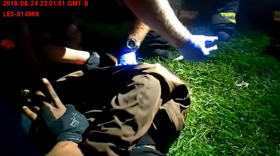Following months of community unrest, Aurora’s city council appointed Vanessa Wilson as the city’s new chief of police in a 10-1 vote Monday night. Wilson, who has been serving as the interim police chief and has been on the force for 23 years, will take the position at a time of great upheaval.
This summer, protests against the death of Elijah McClain have clogged Aurora’s highways. In June, police used pepper spray during a protest that was mostly peaceful. Earlier this month, a protester fired shots after a Jeep drove towards the crowd, injuring two people.
The city of Aurora is opening an independent investigation into McClain’s death; Colorado’s attorney general is launching his own through an executive order from the governor. Four officers were fired for their involvement in a photo mocking the youth man’s death.
As protests continue, including Elijah’s Walk Home, an event to mark the one year anniversary of McClain’s death, Chief Vanessa Wilson joined KUNC’s Colorado Edition to discuss change in her department.
Interview Highlights
These interview highlights have been lightly edited for length and clarity.
Leigh Paterson: For you, what do these ongoing Black Lives Matter protests and incidents — like last weekend Aurora PD pulled guns on a group of Black girls — what does that tell you about the relationship between the police department and the communities it serves?
Vanessa Wilson: It tells me that it’s broken. It tells me that the community is angry and people are demanding change and I’m all for the change. I think there’s been a call to action across this nation. As law enforcement leaders we have to rise to the challenge and accept the fact that the community wants things different. With that, we need to change the way we do business, we need to evolve and we need to hear them. We need to give them a voice and we need to hear what they’re saying and not just keep doing things the same way because it’s not working.
Like many communities in Northern Colorado, Aurora has become much more diverse in recent years. Aurora PD does have two officers assigned to recruiting more diverse candidates. Does this go far enough to building understanding and trust among officers and people of color?
I think it’s a step in the right direction. I can tell you that we just had 30 officers graduate from the academy, and they were extremely diverse. They came from all diffrent backgrounds, many women, Muslim, African American, Hispanic, Asian, were all a part of that, and it was good to see. It was good to see the academy class reflect the diversity within our city.
Obviously we have more work to do. We have a very vibrant and diverse explorer program which is for high school age kids that can be a part of learning about volunteerism and be a part of the agency. I’m hoping that I can work with the civil service commission to allow the chief to have spots that I can fill directly from that explorers program. Of course that has to be approved, and there’s going to be meetings about those things, but that’s what I’m looking forward to doing.
As well as I’d like to have a discussion about the oral board process and so that we can really take a critical look as a police department at who we’re hiring and who’s coming into the agency, to make sure they’re going to be a right fit and to make sure they understand and are willing to accept the change that is coming in law enforcement.
What do you feel is oversimplified on the issue of race and policing? Where do you feel torn?
I think people are hesitant to admit that there’s a problem, because no one wants to be seen as a racist, or no one wants to be seen as sexist or homophobic or any of those things, but we have to start having this conversation, not just in law enforcement but in our communities.
When people call in folks as "suspicious" due to the color of their skin, that’s not appropriate, and that needs to stop, and that needs to be recognized from our dispatchers that are taking the call, from the communities that are making the call, and from the officers that are receiving the call.
I know it’s easy to just put out taglines or something of "I’m going to this" or "I’m going to do that," but I truly am trying to make change here, and I want to work with the city of Aurora to bring implicit bias training to everyone to recognize that we all have it, and it’s nothing we can avoid, but we can try to manage it, and when we manage it to make sure that we’re treating everyone with the dignity and respect they deserve.
I hope the community knows that I’m serious about change, and I’m serious about moving this agency forward, and hopefully healing in the community as best we can.
This interview is from KUNC’s Colorado Edition from Aug. 4. You can find the full episode here.




